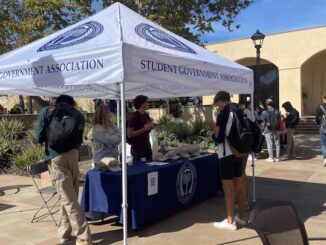
By Shane Stephens
Commuting is a fact of life — especially in Los Angeles.
Commuting can be a stressful task, whether it has to do with the conditions of the road, fear of reckless drivers or weather hazards. These stressors can negatively impact a person’s driving, mental health and even their academic performance.
“I feel safe driving by myself, but not necessarily with other drivers,” junior psychology major Troy Braun said. “They’re not necessarily always the smartest.”
About 40% of undergraduate students commute to the campus, according to Pepperdine.
Commuting in Malibu is challenging at times, especially due to the winding, mountainous canyons or construction along Pacific Coast Highway.
Students Navigate The Malibu Commute
The most time consuming commuting cities in the United States are the ones that are densely populated or have increasing populations.
Eleven of the top 15 cities for longest commuting times are in New York or California, according to a May 14 KTLA article. Recent increases in commuting time are due to an increase of workers leaving the work-from-home life and moving back to the office after the COVID-19 pandemic.
For Pepperdine students, the amount of time it takes to commute to Malibu heavily depends on traffic and timing.
Braun commutes from the Avalon apartments in Calabasas, which are six miles from the Pepperdine Malibu campus through Malibu Canyon Road. Many students at Pepperdine reside here due to the benefits of both price and proximity.
“The commute can honestly go, if it’s at a time where there’s no traffic, 15 to 20 minutes,” Braun said. “If there is traffic, in the morning especially, it could be up to 45 minutes, but it really depends.”
Sean Lee, a senior sport administration major, also lives in Avalon, but has lived there longer and experienced the commute for the last year.
“I feel like at this point I’ve done it enough times, especially again, this being my second year commuting,” Lee said. “I don’t feel super uncomfortable since I’m more cautious.”
Junior finance major Madison Berry also commutes from Avalon most days of the week, whether it is for school or for extracurricular activities like her sorority.
“Now that I plan into my mornings it’s really not that bad,” Berry said. “I now know when I need to leave but it is still unpredictable and stressful at times.”
Students Face Dangerous Conditions
The most uncontrollable danger of commuting is other drivers. With the increase in accidents on PCH, Pepperdine commuters have to be more cautious when driving in Malibu.
Junior advertising major Samantha Conant has a short drive to campus from the Malibu Canyon Village, but she still deals with the stress of having to be safe and plan ahead for any delays.
“My best friend’s big in her sorority was Deslyn Williams, who was in the accident last year, ” Conant said. “I just never really feel safe driving around Malibu, it can be very stressful.”
Alongside the traffic in Malibu, there is ongoing construction that adds to commute time. Weather conditions last spring led to an increase in rock slides in 2024, according to a March 11 CBS News report.
“When it’s rainy or like other conditions that could cause a rock slide, I feel a little bit nervous.” Lee said. “It’s mainly through the canyon when conditions are a little more rainy.”
Rain hit Malibu consistently in the first few months of 2024, with a 48-hour span in early February collecting over five inches of rain at Pepperdine, according to the Santa Monica Daily Press.
Earthquakes are another issue that have hit Malibu recently, according to a Sept. 12 article from ABC. A total of six earthquakes with a magnitude of 3.0 or higher have hit the Malibu area since August, according to Earthquake Tracker.
“There are conditions that make me feel unsafe, especially after the earthquakes,” Braun said. “There was one of the really hard earthquakes that hit, and I was going through the canyon, which had a bunch of rocks on the side of the road.”
How Commuting Affects Health
The conditions of the Malibu commute affect many students beyond just the dangers of the drive. There have been years of research into the effects of commuting on mental and physical health.
The mental effects of commuting include both stress and anxiety, while the physical effects include muscle pain and fatigue.
Psychology Professor Nataria T. Joseph said every student deals with the stress and anxiety of daily tasks like commuting differently.
“It’s a chronic stressor that’s present in their life continuously,” Joseph said. “So for both daily hassles and chronic stressors, a lot of work has looked at both for the cognitive effects.”
Joseph herself is a commuter, having to drive anywhere from 45 minutes to well over an hour every weekday to campus from Granada Hills.
“I have my commute, and it’s rough, it’s really difficult. It’s really variable from day to day,” Joseph said. “It could be very different from day to day. The routes that I need to take could be very different, so I try to give myself way more buffer room.”
Commuting stress can impact memory, making it difficult to study during midterms or finals, Joseph said.
The ability to self-regulate one’s emotions is also impacted by stress and anxiety, which can in turn cause an overload for many students for any daily tasks, such as commuting.
“At any given moment, we’re all exerting self regulation. So that means basically controlling our behavior, kind of controlling what we say, what we do, how we approach people,” Joseph said. “There might be the kind of things that we want to say or do or maybe like socially, it’s not normative or kind of it doesn’t kind of work for that particular setting.”
For many people, specifically in the United States, commuting can feel like a job, due to the high stress environment of the commute along with the time it takes per year, according to a February 2023 Popular Science article.
“If a student’s coming to school everyday, that means during that stressful commute, there’s an excessive output of the stress hormone, cortisol,” Joseph said. “Their stress hormones and maybe their blood pressure gets elevated when the person behind them almost hits them.”
The repetitive nature of commuting will affect a student’s health overtime and although it may not be detrimental, it can still affect another aspect of their life that is important, such as academics.
How Commuting Affects Academics
A survey done in the United Kingdom found that the mental and physical health impacts of commuting negatively impacted academic performance for commuter students, according to a 2022 Science Direct article.
“There’s other behaviors that they might need to just maintain their homeostasis of their body,” Joseph said. “So it takes self regulation to kind of keep our attention focused in the classroom, which could impact our ability to kind of really take in all the material.”
When living at Pepperdine, students have access to more resources to help with their academics. The library, tutoring and being around other students are all ways to help students keep consistent with work.
“The main thing is I have less time to study, get ready for class, coursework and just time,” Lee said. “I get onto campus a little bit later than I was hoping because of traffic or construction so it can affect my class work or study time.”
Living away from Pepperdine can be tough as many students find it difficult to focus on schoolwork when they are in the comfort of their home.
“There’s a difference between being so accessible to the library and then studying in your room,” Braun said. “There’s definitely that mental barrier while you’re studying.”
Shorter commute times not only lead to more satisfaction in people’s work, but also better mental health and physical health, according to a 2019 academic article in Transportation.
“There’s so many distractions off campus,” Conant said. “I think I’ve gone to the library one time this semester but that’s where I’m always the most productive.”
Balancing the stress of commuting in Malibu, along with the task of being a full-time student, can pile onto someone quickly, affecting their memory, which can hurt their academic performance.
“When I have a late night and I have to drive to campus just for one class, it can stress me out,” Berry said. “I’ll sometimes forget something, whether it’s material I needed to bring or work I needed to do.”
Shane Stephens reported this enterprise story in Jour 241 during the Fall 2024 semester under the supervision of Dr. Christina Littlefield and Dr. Theresa de los Santos. Dr. Littlefield supervised the web article.




